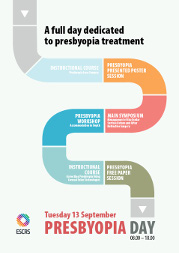Posters
A new multifocal intraocular lens: improving the depth-of-focus with a fractal profile
Poster Details
First Author: S. Garcia-Delpech SPAIN
Co Author(s): L. Remon A. Hervas P. Udaondo J. Monsoriu W. Furlan
Abstract Details
Purpose:
To theoretically and experimentally assess a new hybrid refractive-diffractive multifocal intraocular lens (IOL) envisioned to provide an extended the range of visión by compensating the chormatic aberration.
Setting:
Diffractive Optics Group (Universidad de Politécnica de Valencia-Universidad de Valencia
Methods:
The optical profile of the IOL was designed using the demonstrated extended depht of focus property of diffractive fractal zone plates (FZP). Numerical calculation software tools enabled a complete theoretical characterization of the designs. Fractal IOLs were manufactured with a precision lathe and validated by in vitro testing in an optical bench. According to the ISO 11979-2 and ISO 11979-9 standards Image contrast of the IOL was assessed by measuring the MTF at different spatial frequencies and apertures. The through-focus MTF was measured for different object vergences for a given spatial frequency and aperture.
Results:
There was an excellent agreement between the theoretical and manufactured IOL profile. The fractal IOLs produce two main foci surrounded by numerous secondari foci. These secondary foci are axially distributed near the major ones and together form a compound focal volume that provides a greater depth of field, and consequently, a good functional vision at far, intermendiate and near distances. The simulated and achieved light distribution and focus distribution showed good concordance.
Conclusions:
The combination of refractive and diffractive feaures of a fractal distribution of zones in a pseudophakic IOL resulted in an unpreceeded design with a validated extended depth of focus. The IOL design can be combined with aspheric and toric profiles and can be customized. According to the results Fractal IOLs favors distance vision in mesopic conditions without increasing halos or glare perception under dim light or large pupil conditions thank to its low chromatic aberration. Further clinical investigations are required to validate these principles.
Financial Disclosure:
NONE





